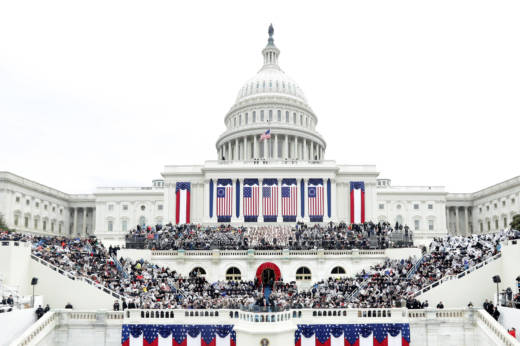Yes, you can find a George Washington quote out there on the internet in which he uses the exact phrase that's so common today:
"What is most important of this grand experiment, the United States? Not the election of the first president but the election of its second president. The peaceful transition of power is what will separate this country from every other country in the world."
But that quote is a fake.
A quick search through some readily available historical sources -- The New York Times archive going back to 1851, Newspapers.com, Google news and book searches -- suggests that our focus on the inauguration of a new administration as a "peaceful transition of power" is the product of the last few decades.
Earlier news accounts most often applied that phrase and similar formulations to nations where our idea of democracy had a tenuous hold -- far-off places in Asia, Africa and elsewhere in the Americas where changes in regime frequently involved bloodshed.
The day when our own transition became an object of wonder appears to be Jan. 20, 1981. At the outset of his first inaugural address, President Ronald Reagan started with this observation:
"To a few of us here today this is a solemn and most momentous occasion, and yet in the history of our nation it is a commonplace occurrence. The orderly transfer of authority as called for in the Constitution routinely takes place, as it has for almost two centuries, and few of us stop to think how unique we really are. In the eyes of many in the world, this every-four-year ceremony we accept as normal is nothing less than a miracle."
I can't claim my review of news sources is either exhaustive or entirely authoritative. But one thing is pretty easy to see. Mentions that associated U.S. presidential inaugurations -- or U.S. politics in general -- with the notion of a peaceful (or orderly) transition (or transfer) of power have been relatively infrequent, even after Reagan's mythologizing.
But that changed this past year. With Donald Trump's frequent insistence during the campaign that the vote would be rigged against him, with his refusal to pledge he'd accept the election result, discussions of the transition -- and whether it would be peaceful or something else -- became a frequent topic of discussion in news columns.
In the end, as we all know, Trump squeaked out a narrow Electoral College victory despite getting nearly 3 million fewer votes than his opponent. He was more than pleased to accept the result, and we got our peaceful transition of power once again.
Near the conclusion of the Constitutional Convention in 1787, Benjamin Franklin was asked what sort of government the conclave had devised -- a monarchy or a republic.
Franklin's famous response: "A republic, if you can keep it."
Meaning the work of American democracy, with all its imperfections, was just starting. Meaning that the Constitution itself, the system of government it creates and the society it animates would survive only with constant attention and care.
And meaning, finally, that the work, the attention and the care need to go much further than observing a quadrennial transition ritual.
